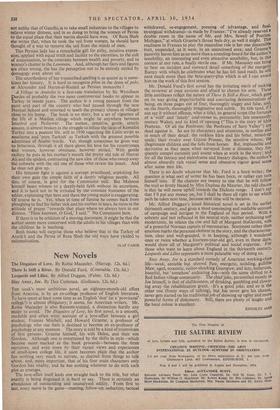New Novels
THE week's most ambitious novel, an eighteen-month-old effort from America, is by an ex-college professor ..of English literature.
To have spent at least some time as an English 'don' (at a 'provincial'.
college?) is almost obligatory, it seems, for American writers. Mr.
Robie Macauley is also Ransom-trained, a distinction hardly any easier to avoid. The Disguises of Love, his first novel, is a smooth, readable and often witty account of a love-affair between a girl student, Frances Mitchell, and Howard Graeme, a professor of psychology who one feels is destined to become an ex-professor of psychology at any _moment. The story is told by a kind of triumvirate of first persons: Graeme himself, his wife Helen, and their son Gordon. Although one is entertained by the shifts in style—which become more marked as the book proceeds—between. the three narrators, and even more by their varied views and experiences of small-town college life, it soon becomes plain that the author has nothing very much to narrate, as distinct from things to talk about, and, more important, that of his four main characters only Gordon has vitality, and he has nothing whatever to do with such plot as emerges.
The love-affair itself leads one straight back to the title, but what exactly is being disguised it is hard to say. There is certainly an abundance of outstanding and unanalysed oddity. From first to last, every move in the game—meeting, follow-up, seduction, tactical
withdrawal, re-engagement, pressing of advantage, and final* strategical withdrawal—is made by Frances: "I've already reserved* double room in the name of Mr. and Mrs. Sewell of Pontiac), Michigan," at which Graeme's throat feels dry, as well it might. VIII readiness in Frances to play the masculine role is her one discernible trait, suspended, as it were, in an unenclosed area; and Graeme'S passivity leaves him as no more than a sounding-board for the author's sensibility, an interesting and even attractive sensibility, but, in this context at any rate, a finally sterile one. If Mr. Macauley can brinS to bear on incident and outward detail something of the energetic fluency with which he celebrates what he has felt (and read), he will earn much more than the beta-query-plus which is all I can award him on the work of this first session.
Mr. Donald Ford's first novel has the irritating merit of makinS the reviewer at once anxious and afraid to chance his arm. These little antitheses reflect the nature of There Is Still a River, which goes, on its way giving imperturbable and convincing demonstrations of being, on three pages out of four, thoroughly stagey and false, and, on the fourth, thoroughly imaginative and subtle. Its title (and, if I can say it without offence, what a title), its general scope (the fortunes of a wild' and 'lonely' coal-owner in, presumably, late nineteenth- century Wales), and its kind of opening ("This is the story of Idris Penbran. Of all the Penbrans: the Penbrans of Sarn Valley") are dead against it. So are its characters and situations, in outline and in much of their detail: the reckless Idris and his bitter, mixed-up uncle; their rivalry over alma; Prosser, the sensitive whore; the illegitimate children and the falls •from horses. But, implausible and derivative as they seem when surveyed from a distance, they fre- quently compel curiosity and assent when at work in the story; and for all the fantasy and melodrama and literary dialogue, the author's almost absurdly rich visual sense and obsessive vigour goad scene after scene into life.
There is no doubt whatever that Mr. Ford is a born writer; the question is what sort of writer he has been born, or rather can turn himself into. If the chances are twenty to one that he will follow the trail so firmly blazed by Miss Daphne du Maurier, the odd chance is that he will move uphill towards the Dickens range. I don't say that 1'11 put any money on, but I shall be there all right to see which path he takes next time, because next time will be decisive.
Mr. Alfred Duggan's latest historical novel is set in the earlier thirteenth century, and gives a most convincing and readable account of campaign and intrigue in the England of that period. With a sobriety and tact reflected in his neutral style, neither archaising nor modernistic, he relates the rise and fall of Margaret fitzGerold, wife of a powerful Norman captain of mercenaries. Sentiment rather than emotion marks the personal element in the story, and the characterisa- tion, clear and well-grasped, is in keeping, although I wondered once or twice whether a fourteen-year-old girl, even in those days, would show all of Margaret's political and social expertise. For those who want to learn about England in the thirteenth century, Leopards and Lilies represents a most palatable way of doing so.
Stay Away, Joe is a standard comedy of American working-class life—weak, amiable but shrewd Paw, energetic, scolding, gullible Maw, aged, eccentric, visitor-shocking Grampaw, and lazy, lecherous, boastful, but 'somehow' endearing Joe—with the scene shifted to a Red Indian village community. The chief joke, personified mostly in Joe himself, is that of shiftlessness, of drinking, gambling and clown- ing away the rehabilitation grant. It's a good joke, and so is the other one (funny ways of talking), but Joe never gets his chance, never gets started on his traditional job of showing up uglier and more powerful forms of dishonesty. Still, there are plenty of laughs and the local colour is excellent,
KINGSLEY AMI


































 Previous page
Previous page